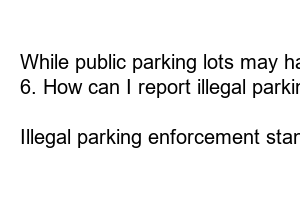불법주정차 단속 기준
Title: Illegal Parking Enforcement Standards: Ensuring Order on the Roads
Introduction:
Illegal parking has become a widespread issue, causing inconvenience and chaos on our roads. To tackle this problem effectively, it is crucial to understand the enforcement standards that govern this area. In this blog post, we will dive deep into the illicit parking regulations and explore key aspects of illegal parking enforcement.
1. The Significance of Illegal Parking Enforcement:
Illegal parking enforcement plays a vital role in maintaining order and safety on the roads. It ensures a smooth flow of traffic, prevents accidents, and promotes fairness among road users. Implementing strict enforcement standards to combat this problem is of utmost importance for any well-functioning city.
2. Determining Illegal Parking:
*Illegal parking* refers to any act of parking a vehicle in violation of the specified rules and regulations. It encompasses parking in restricted areas, blocking driveways or fire hydrants, exceeding time limits, or parking in handicapped spaces without proper authorization.
3. Identifying Parking Enforcement Measures:
To enforce illegal parking regulations effectively, cities typically employ a combination of measures including:
– Regular patrols by parking enforcement officers
– Installation of surveillance cameras to monitor and capture violations
– Use of technology such as automatic license plate recognition (ALPR) systems
– Collaborative efforts with tow companies to remove illegally parked vehicles.
4. Issuing Parking Citations:
When individuals commit illegal parking violations, they may receive parking citations. These citations serve as official notices of the violation and generally include the date, time, and location of the offense, as well as the associated fines or penalties. Citations can be written by parking enforcement officers or generated automatically by ALPR systems.
5. Consequences of Illegal Parking:
Illegal parking can result in a range of consequences, including fines, vehicle impoundment, towing charges, and even license suspension for repeated offenders. Moreover, habitual illegal parking obstructs emergency response vehicles, creates traffic congestion, and causes inconvenience for other drivers.
6. Importance of Public Awareness and Education:
Raising public awareness about the significance of adhering to parking regulations through campaigns and educational programs is vital. By educating individuals about the consequences of illegal parking, people become more conscious of their actions and contribute to a safer and more orderly environment on the roads.
FAQs:
1. How can I contest a parking citation?
If you believe you received a parking citation in error, you typically have the option to contest it by following the instructions provided on the citation. This may involve providing evidence or requesting a hearing.
2. Can parking enforcement officers issue citations for expired permits?
Yes, parking enforcement officers are authorized to issue citations for expired parking permits. It is essential to renew your permit on time to avoid violations.
3. Are parking regulations the same in every city?
While there are commonalities among parking regulations, each city may have specific rules and enforcement procedures. It is recommended to familiarize yourself with the local parking regulations when visiting or moving to a new area.
4. Can illegally parked vehicles be relocated without prior notice?
In some instances, particularly when obstructing traffic flow or posing a safety hazard, illegally parked vehicles may be relocated or towed without prior notice. This action is typically taken to ensure the smooth functioning of road systems.
5. Is there a certain grace period for parking violations in public parking lots?
While public parking lots may have their own specific guidelines, it is essential to adhere to the posted regulations. Many parking lots enforce strict time limits, and exceeding them may result in a violation.
6. How can I report illegal parking in my neighborhood?
If you notice illegal parking in your neighborhood, you can report it to the local parking enforcement authorities or local law enforcement agencies. Provide them with accurate details such as the license plate number, location, and time of the violation.
Summary:
Illegal parking enforcement standards are essential for maintaining order, safety, and fairness on our roads. By understanding the significance of these standards, identifying various enforcement measures, and recognizing the consequences of illegal parking, we can contribute to a more harmonious and efficient traffic environment. Remember, education and public awareness play a significant role in preventing illegal parking incidents and fostering responsible parking behavior for the benefit of all road users.

